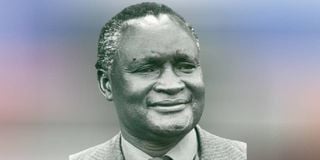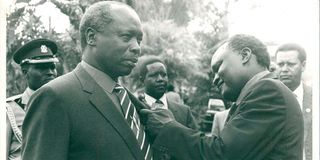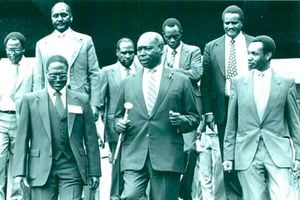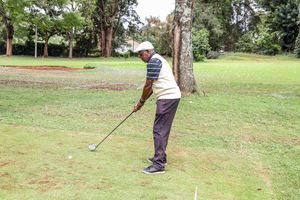
Former Cabinet minister Nathan Munoko.
When Nathan Waliaula Munoko, one of the pioneer senators and the longest-serving Kenya African National Union (Kanu) organising secretary, retired from active politics in 1984, little was heard of him since.
A Kanu loyalist and former minister in the Mzee Jomo Kenyatta government, Mr Munoko preferred a quiet life away from controversies until his death on December 19, 2024, at the age of 102 years.
But this is the story of the life and times of a man who wore many feathers during his life as a politician, an administrator and a teacher as told through the lenses of his family and friends.
In an interview with the Nation, Munoko’s surviving widow Doris Imiti Munoko said she remembers her late husband as a man of integrity who stood by his words.
“I am not in the right state now to talk more about Mzee (Munoko) but I can tell you that he was a straightforward person,” she said on Tuesday.
Mzee Munoko had been in and out of hospital with various ailments over the past few years. He passed away at 3 pm on December 19, 2024, at the Aga Khan University Hospital at the age of 102 and a half years.
The former assistant minister will be buried on January 4, 2025, in Endebbess, Trans Nzoia County.
Political commentator and a close family friend Martin Andati, remembers how in one of his encounters with the late Munoko, he divulged to him how the late President Daniel Arap Moi wanted to make him a vice president when he took over in 1978.
However, according to Mr Andati, the plan never materialised as the late Mwai Kibaki and Elijah Mwangale got wind of it and ganged up to thwart the idea.
“Munoko was very close with President Moi and he even campaigned for him during the 1979 General Election,” Mr Andati told the Nation.
Snap-elections
“In President Moi’s scheme of things, he used Munoko as the brains to manage Jaramogi Oginga borrowing from his knowledge of the area and its dynamics having worked in the region as an administrator,” he added.
He says Mr Munoko would, however, lose the Bungoma Central seat and did not vie in the 1983 snap-elections and would a year later retire from active politics.

Miriam Rahedi, a member of the Kenya Yearbook Editorial Board, presents a copy of the Kenyatta Cabinets book to Nathan Munoko, former Minister of Works, in Nairobi on October 19, 2012.
Another close friend of Munoko’s family, Kizito Mutongoi, recalls the late veteran politician as a man who shied away from controversies and kept a low profile after exiting active politics.
“As a strong Quaker, he preferred doing things quietly and away from controversy. He had a very sharp memory and would remember all the events, even those that happened at independence,” said Mr Mutongoi.
The veteran politician would then serve as Kanu national executive officer between 1985 and 1988, having served as its organising secretary between 1966 and 1985, and was a KANU life member number 12.
On December 12, 2021, former President Uhuru Kenyatta awarded him with an Elder of the Burning Spear honour, second class, in recognition of his distinguished and outstanding service in his various capacities and responsibilities.
President William Ruto mourned the pioneer politician as a selfless and dedicated leader who served the country with distinction.
“Our country has lost a selfless and dedicated leader who served with distinction. He was progressive, focused, and a trendsetter. May God grant strength to his family, loved ones, and the people of Bungoma County during this dark moment. Rest in peace,” President Ruto said.
Mr Munoko served the country in various capacities starting as an assistant minister in Kenyatta’s Cabinet where he held various portfolios including as an assistant minister for Co-operatives and Marketing in 1964, before moving to the department of Housing and Social Services in 1965 in the same capacity, then to Local Government in 1966 and lastly serving in the department of Agriculture in 1974.
He was later elevated to the position of a minister for Works from 1975 to 1979 and during his tenure, he supervised the construction of Mtwapa and Nyali bridges at the Coast in collaboration with the government of Japan.
In 1978, he supervised the construction of the Mausoleum for the late founding President.
Mzee Munoko joined the Kenya African Democratic Union (Kadu), which was formed in 1960 as an alliance of minority ethnic groups, and was elected Senator for Bungoma District in 1963.
He served as the leader of the Opposition under Kadu and later as the deputy speaker in the Senate. However, in 1964 Kadu dissolved itself voluntarily and joined KANU.
Since the Constitution stipulated elections on rotation for senators, Mzee Munoko picked a ballot disc for re-election after two years.
He successfully defended his seat in 1965 on a Kanu ticket and served until 1967 when the Senate was abolished. As of 2024, he was the only survivor of senators elected in 1963 and was a life member of the Commonwealth Parliamentary Association.
Harambee schools
Between 1967 and 1978, he served as MP from Bungoma Central (which had been created after the abolition of the Senate).
During his tenure as MP, he helped the community to establish 35 harambee schools all of which are now government schools. He also spearheaded the improvement of roads and bridges which improved access in rural areas.

Kanu Secretary-General Nathan Munoko pins a party badge on President Moi.
Mzee Munoko was born in Kolani village of Bungoma County in Kenya on May 20, 1922. After primary and secondary schools, he attended the Alliance High School in Kikuyu in 1941 and 1942 and was admitted to Makerere University College in 1943 where he obtained a Diploma in Veterinary Science (EA) in 1947.
In 1959, he attended a course in Commonwealth Studies in Local Government at Oxford University.
He began his career in the civil service in 1948 as a Veterinary Officer for the Nyanza region based at Maseno, and later for the Coast region based at Mariakani.
He then joined Siriba Technical Training Institute where he taught Veterinary Science until 1956.
In 1956, he was appointed the first Secretary to the African District Council (ADC) of Elgon Nyanza District replacing the District Commissioner as Chief Executive Officer to the Council.
He served in this capacity until 1963 with the Council making a lot of achievements during his tenure.
The Council facilitated agriculture, enriching residents through the production of coffee and cotton among others.
Likewise, under the District Education Board (DEB), the Council started many Secondary Schools such as Bungoma High School to complement mission schools.
From 1959, he was also the chairperson of the Bungoma Branch of the Child Welfare Society of Kenya. He later served as the national chairperson of the Society taking over from the former Speaker Humphrey Slade. He thereafter served as one of the National Trustees of the organisation into his later years.
Mzee Munoko also held positions in County Commissions of Kisumu, Sirikwa, Nandi, Central Rift and the Mombasa Boundary Commission.
Further, he served as a member of the Board of Governors of the Makerere College Council, Friends School Kamusinga, Lake Victoria North Water Catchment Board, Western College of Arts and Technology, and the Water Apportionment Board.
He also served as Chairman of the Board of Governors of Lugulu Girls High School, the Sangalo Institute of Science and from 1980 to 1983 he was Chairman of the Lake Basin Development Authority.









